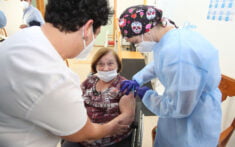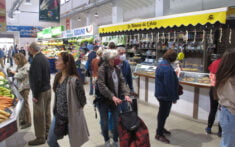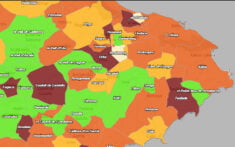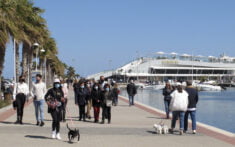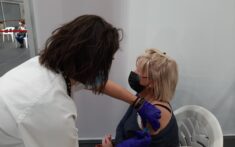Health professionals who live day to day in different hospital centers, describe to Dénia.com how their work is being and how it affects them personally and their own families. Extreme precautions and pain from difficult situations are the common denominator.
"The day to day in La Pedrera is very different"
Toñi López has been a nurse at the HACLE (Hospital for the Care of Chronic and Long-stay patients) of La Pedrera, in Dénia since its inception. Despite his long experience, since he has been practicing in Dénia since 1986, he has noticed that the situation has now changed as never before: "Each patient is isolated in their room, and they can only go out into the corridor one by one, they cannot receive visits from relatives (only by videoconference), and families are informed from the center once a week". If we consider that La Pedrera is an open hospital and that activities are usually carried out every day, the fact of isolation is even more noticeable. As Toñi explains, "This is a difficult situation that produces a lot of sadness, and although most understand it, the reality is that they have not seen their family for a month".
Both health personnel and patients have the psychological support they need and, furthermore, they have had no problem with the protection material because they are not on the front line like other hospitals. According to Toñi López, "In the only contact I had with the positive case in COVID-19 that was in the center, I went with the entire EPI team. We also had a low suspicion of a possible positive case and all the tests were carried out with the appropriate protection, which comes to double the drop insulation protection ". The policy that the Hospital de La Pedrera follows is, in the case of a positive, transfer him to his home hospital, since HACLE patients are fragile in this situation, they are at vital risk.
When a toilet comes home
As the nurse tells us, the staff is in good spirits and strictly follows the protocol: "Personally, I am not worried about myself, but I am worried about my family, you are afraid to infect them and that is what causes me some anxiety. At home I live with my husband who belongs to the risk group, and with my grandson, who we take care of precisely because his parents are anesthetists. " López takes all precautions: when entering the house, the first thing is to leave the clothes to wash, shower, and then he is allowed to come into contact with his family. Her grandson does not get in his car, and every eight days he makes the purchase so as not to expose himself anymore.
"We live in moments of helplessness and frustration, but we go ahead for everyone"
When Alberto Lozano arrives home, the clothes he has brought to work remain in the trunk. And it does not take contact with its family until all the hygienic measures are carried out. Alberto is a Dénia neighbor and works as a nurse at the Hospital de la Vila Joiosa.
This last month has been on a rotating basis: "I started in early March with the arrival of the first cases and all the change began in the hospital to welcome the positives. Services were canceled to have new spaces prepared for what might come. I can say that the ICU has not had to stop admitting a patient for not occupying ICU. " Alberto acknowledges that he changed the protocol and caught everyone a bit off guard, causing some disorganization, but he never lost control. Each hospital has adapted as it could within its resources, and now people are more aware and the situation more normalized, according to the nurse.
According to Lozano, "This situation we are experiencing is very difficult: you see the patient isolated, alone, without being able to be accompanied by a family member. In the case of deaths, it is very sad, you feel helpless when you fight a lot and the patient does not get ahead, and also their families have not been able to be with them. It is a cold situation because you cannot have any kind of contact either. In my case, for two weeks I did ten shifts in which there were three deaths, and it is frustrating to see how people turn off, you feel utter helplessness because nothing can be done anymore. " The nurse points out that it is a total, radical change in attitude, that the health personnel are experiencing moments of saturation but that they continue for everyone.
Psychological help to toilets
Due to the great burden of care, emotional suffering and stress suffered by health professionals and patients in this coronavirus situation, the Ministry of Health announced the provision of psychological service to help cope in a better way day to day.
Both Alberto and Toñi agree that this psychological attention is provided to professionals and patients, "It is about five minutes of session and although at first we liked these meetings, now we see them as a moment of disconnection and of gathering strength to continue with the day", explains the nurse.
For his part, Lozano points out that in the face of the great emotional charge that is lived from within "I believe that many professionals will need psychological help to overcome what they are experiencing, especially those who have had the most contact or have with patients".




